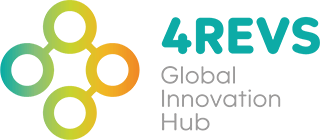4Revsピックアップ
2022年2月18日
手頃な価格で信頼性の高い太陽光発電ソリューションを地域社会に提供する。

■ 概要
ジンバブエは水力発電に頼っています。農村部では、80〜90%の人々が調理用の照明を木質燃料や灯油に頼っています。穀物の製粉などの食品加工作業は、通常、ディーゼル発電システムを使って行われています。
2009年の総発電量は7,900ギガワット時(Gwh)。このうち53%が再生可能エネルギーである。2009年の国民一人当たりの電力消費量は1,022キロワット時(kWh)。このうち33.9%が水力発電所の設備容量です。
このケースでは、高品質な分散型で拡張性のある新世代のモジュール式太陽光発電システムを、家庭や企業向けにPAYG(Pay As You Go)方式で販売・配布・設置する、女性主導の営利目的の社会的企業であるPowerlive社の取り組みを紹介します。
■ 問題
アフリカでは、小規模農家や農村部の企業、学校や教会などの施設など、個人の農村部の無電化世帯が数多く存在します。エネルギーへのアクセスができないため、彼らは暗闇の中に置かれ、生産性や生活の質を低下させています。
■ 背景
シャロンは、ジンバブエの女性とそのコミュニティにクリーンで安全な持続可能なエネルギーソリューションを提供する大手エネルギープロバイダー、Powerlive ZimbabweのCEOを務めています。彼女の望みは、再生可能な資源を使って女性の生活をより良くし、小さな力を可能な限り与えていくことです。
■ ソリューション
Powerliveは、PAYGOモデルにより、遠隔地の農村部のオフグリッド・コミュニティに手頃な価格のクリーンエネルギーを提供する社会事業です。私たちは、国内および生産的な使用のために、アクセス可能で手頃な価格のクリーンな太陽エネルギーを提供しています。
■ インパクト・ステートメント
本プロジェクトは、4,000世帯以上の農村部の家庭にエネルギーアクセスを提供し、エネルギー関連の支出を年間24万ユーロ削減します。また、このシステムは300MWhの電力を生成します。
灯油やロウソクなどの非再生可能エネルギーに代わるクリーンなエネルギーを年間300MWh生み出し、温室効果ガスの排出を削減します。このプロジェクトは、ジンバブエの550人の女性に雇用を創出します。
■システムの視点から
PowerliveのCEOであるSharon Yetiは、エネルギーサービスへのアクセスが女性の健康と福祉を向上させることで、持続可能な開発のための2030アジェンダに沿った、ジェンダー平等に関するSDG5と、手頃でクリーンなエネルギーに関するSDG7の達成をサポートすることができると考えています。
==========詳細==========
■ 問題点
ジンバブエの電力アクセスは40%ですが、都市部(80%)に比べて農村部(19%)の電力アクセスは大幅に低くなっています。
ジンバブエでは通信容量が大きな問題となっています。1988年にHwange Coal Plantの運転を開始して以来、国内の発電部門では新たな開発が行われていない。そのため、国内の設備容量の約60%しか利用できない。
さらに、ジンバブエのすべての石炭火力発電所は、頻繁に生産が停止したり、まったく生産されていないため、大規模なアップグレードが必要である。そのため、ジンバブエでは頻繁に、そして長期間にわたって停電が発生しています。近隣諸国からエネルギーを輸入しても、容量不足の問題を解決するには十分ではありません。その結果、停電は産業やサービスの経済的パフォーマンスに影響を与え続けています。このような状況を緩和するために、国中で小規模な発電機が使用されています。
■ 背景
ジンバブエのエネルギー供給の選択肢は、水力発電、石炭、再生可能資源が混在しています。1980年以降の取り組みにより、農村部のビジネスエリアや政府の行政エリアへの供給が拡大され、送電網はよく整備されています。
ジンバブエの電力の多くは、Kariba Dam水力発電所(約750MW)、920MWのHwange火力発電所、および3つの小規模な石炭火力発電所で生産されています。
カリバ・ダム水力発電所以外にも、特にザンベジ川沿いにはまだまだ水力発電の可能性があります。太陽光発電は、小規模でも大規模でも大きな可能性を秘めています。また、風力発電やバイオガス発電も可能です。
■ ソリューション
パワーライブ・ジンバブエは、女性が主導する営利目的の社会的企業です。ジンバブエの農村部や都市周辺部のオフグリッドの一般家庭や小規模農家、学校を対象に、高品質で分散化されたスケーラブルな新世代のモジュール式家庭用・業務用エネルギーシステムを、戦略的に配置された農村部の女性ソーシャルグループのネットワークを通じて、PAYG(Pay As You Go)方式で販売・配布・設置しています。
■インパクト・ステートメント
Powerliveプロジェクトは、ジンバブエの女性とそのコミュニティに、クリーンで安全かつ手頃な価格の太陽エネルギーソリューションを提供します。Powerliveプロジェクトでは、4,000台以上のソーラーホームシステム(SHS)をPAYGで農村部のオフグリッド世帯に配布することを目指しています。このモジュール式システムは、発電量が50〜80Wで、Tier5のサービスまで拡張することができます。また、システムの半分は、ソーラーポンプや食品加工機などの生産性の高い資産と一緒に販売され、Powerlive社は女性の小規模起業家に指導を行います。
Powerlive社はこれまでに、ジンバブエの非電化地域や疎外された地域に3500台以上のソーラーホームシステムを販売、配布、設置してきました。Powerlive社の使命は、ジェンダーレンズを用いてエネルギーの貧困をなくすことであり、農村地域に住む女性に力を与えています。Powerliveでは、販売代理店の85%、技術者の40%が女性です。
Powerliveは、戦略的に配置された農村部の女性社会グループのネットワークを通じて、ジンバブエの農村部および都市周辺部のオフグリッドの一般家庭、小規模農家、学校を対象としています。
Powerliveジンバブエは、エネルギーアクセスに対するジェンダーレンズのアプローチと、困難な市場での成功が評価され、2021年のEEPアフリカ・スタートアップ・プロジェクト・オブ・ザ・イヤーに選ばれました。Powerliveは、ジンバブエの農村部やオフグリッド地域で、拡張性のあるソーラーシステムや家電製品を従量制モデルで販売している現地の社会企業です。Powerlive社は、ジンバブエの農村部やオフグリッド地域において、拡張性のある太陽光発電システムや家電製品を従量制モデルで販売しています。
「Powerlive社は、厳しい市場の中で、ビジネスの初期段階から顕著な成功を収めました。バリューチェーンを通じたジェンダーへの影響力の強さは非常に印象的です。
Powerlive社とお客様との関係は、健康と勉強時間を改善するための照明に始まり、安全で清潔な飲料水を確保するための給水ポンプに続きます。これらの基本的なニーズが満たされた後は、情報へのアクセスを可能にするラジオやテレビ、そして、バリカンや冷蔵庫など、収入を増やすためのさまざまな家電製品が提供されます。また、Powerliveは、女性の販売代理店や顧客に対して、金融リテラシーのトレーニング、市場へのリンク、メンターシップを提供しています。
■ 関連リンク
Powerlive社がプロジェクトへの融資契約を締結
ジンバブエのオフグリッド地域でインターネットとデジタル革命をリードするPowerlive
Powerliveが2021年のスタートアップ・プロジェクト・オブ・ザ・イヤーに選ばれる
※自動翻訳による翻訳です。
4Revsにご興味をお持ちの方は、事務局までご連絡ください。
Feb 18, 2022
PowerLive: Creating a planet run by the Sun - Providing affordable and reliable solar energy solutions to the communities -
#energy#climate-change#greenhouse-gases
The following is an extract.
【Abstract】
Zimbabwe relies on hydroelectric power. In rural parts of the country, 80-90% of the people depend on wood fuel and kerosene for cooking lighting. Food processing tasks like milling grain are usually carried out with a diesel-powered system.
Total electricity generation in 2009 was 7,900 gigawatt hours (Gwh). 53% of this was produced from renewable sources. Electricity consumption per capita in 2009 stood at 1,022-kilowatt hours (kWh). 33.9% of this total installed capacity was from hydroelectric plants.
Zimbabwe relies on hydroelectric power. In rural parts of the country, 80-90% of the people depend on wood fuel and kerosene for cooking lighting. Food processing tasks like milling grain are usually carried out with a diesel-powered system.
This case focuses on how Powerlive a for profit women-led social enterprise that sells, distributes and installs high-quality decentralized and scaleable new generation of modular solar home and business energy systems on Pay As You Go (PAYG) basis.
== Main Highlights ==
The Problem:
In Africa, there are many individual, rural, off-the-grid households that are small scale farmers and rural businesses as well as institutions like schools and churches. The lack of access to energy leaves them in the dark, reducing their productivity and quality of life.
The Context:
Sharon is the CEO for Powerlive Zimbabwe, a leading energy provider generating clean, safe and sustainable energy solutions to women and their communities in Zimbabwe. Her ambition is to make women’s lives better and empower them in the smallest way possible through renewable resources.
The Solution:
Powerlive is a social enterprise that makes affordable clean energy available to remote rural off-grid communities through a PAYGO model. We are providing accessible and affordable clean solar energy for both domestic and productive use.
Impact Statement:
The project will provide energy access to over 4,000 rural households and generate annual savings of EUR 240 000 in energy-related expenditure. The systems will generate 300 MWh of clean energy per year and reduce greenhouse gas emissions by replacing kerosene, candles and other non-renewable energy sources. The project will create jobs for 550 women in Zimbabwe.
Systems Perspective:
Powerlive C.E.O, Sharon Yeti believes that access to energy services can improve women’s health and well-being thereby supporting the achievement of SDG 5 on gender equality and SDG 7 on affordable and clean energy in line with the 2030 Agenda for sustainable development.
Case Overview
The Problem:
Although national electricity access stands at 40%, access to electricity in rural areas (19%) is much lower than that in urban areas (80%) due to the prohibitive costs of extending national electricity grids.
Capacity is a major concern in Zimbabwe. No new developments have occurred in the country’s generation sector since the commissioning of the Hwange Coal Plant in 1988. Thus only about 60% of the country’s installed capacity is available.
Furthermore, all coal-fired stations in Zimbabwe are in need of major upgrades as currently they have frequent production stops or are not producing at all. This has led to frequent and long lasting blackouts in the country. Imports of energy from neighboring countries are not enough to solve the under capacity problem. As a result, power outages continue to affect the economic performance of industries and services. Small-scale power generators are used all over the country to ease this situation.
最新のピックアップ
-
2024年3月8日
Mar 8, 2024
lithium battery; energy transition; recycling; closed loop

-
2024年3月6日
Mar 6, 2024
Tomato Jos: Investment & Impact into Nigeria’s Tomato Industry

-
2024年3月4日
Mar 4, 2024
ネイチャー・ポジティブに資する 投資は、世界全体のわずか 3%に過ぎない
Only 3 per cent of global investments are nature- positive

-
2024年2月3日
Feb 3, 2024
Towards sustainable regenerative food systems

-
2024年1月4日
Jan 4, 2024
Climate adaptation – 150 options for water in agriculture

